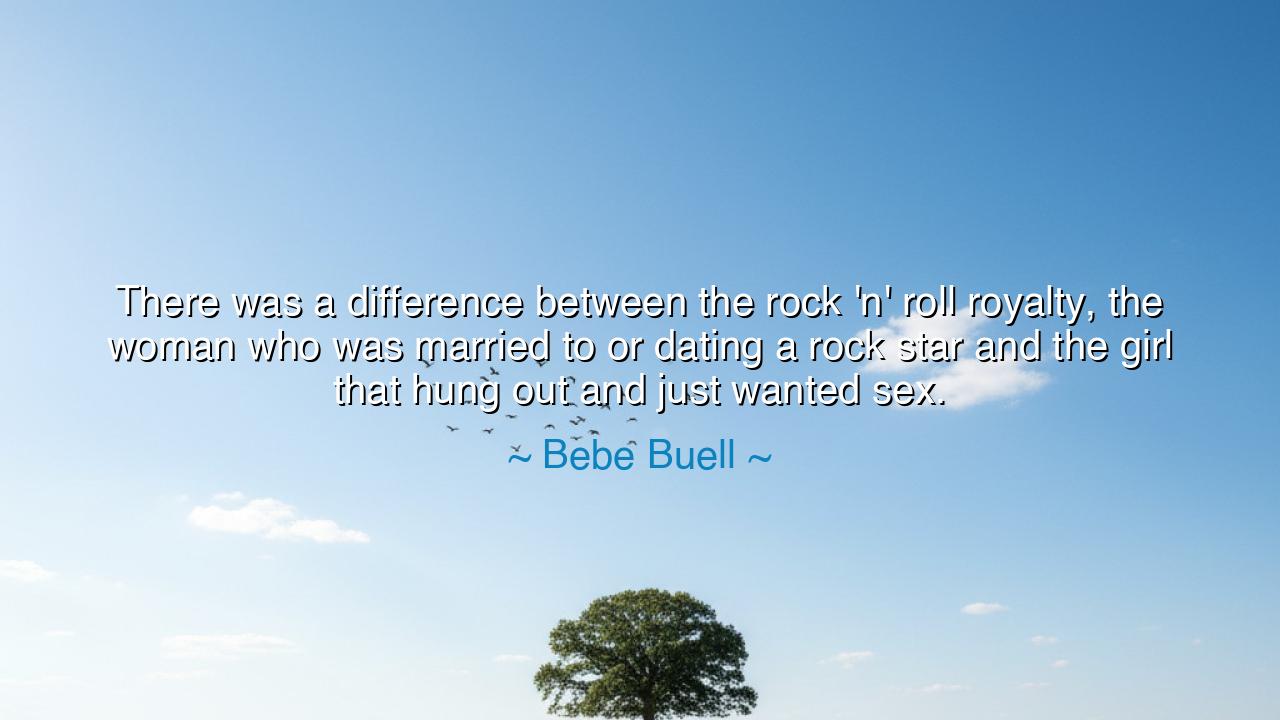
There was a difference between the rock 'n' roll royalty, the
There was a difference between the rock 'n' roll royalty, the woman who was married to or dating a rock star and the girl that hung out and just wanted sex.






The words of Bebe Buell—“There was a difference between the rock ’n’ roll royalty, the woman who was married to or dating a rock star and the girl that hung out and just wanted sex”—resound not merely as a reflection of celebrity culture, but as an observation of identity, dignity, and the eternal distinction between passion and purpose. Beneath her candid tone lies an ancient truth: that in every era, society distinguishes between those who love for depth and those who seek only pleasure, between those who share in greatness and those who chase its glow. Buell’s words are not about vanity or hierarchy, but about authentic connection versus fleeting desire, about the sacred difference between being seen and being used.
In the wild, chaotic world of rock ’n’ roll, where fame burned bright and fast like lightning over dark waters, there existed an unspoken order—a social mythology that separated the devoted from the transient. To be among the “rock ’n’ roll royalty” was not merely to stand beside a famous man, but to share in his rhythm, his struggle, his art. It was to be part of a story larger than the self, to navigate the storms of fame with loyalty and courage. These women—muses, partners, often artists in their own right—stood not as ornaments, but as keepers of balance in worlds driven by chaos. In contrast, the “girl that hung out” represented something else entirely: the passing spirit of indulgence, the flicker of pleasure that left no mark upon the soul.
Yet Buell’s words also hold compassion. She does not condemn those who sought only the thrill of proximity, the brief warmth of passion. She merely acknowledges the difference—a difference as old as humanity itself. In the ancient temples of love, there were priestesses who served with sacred devotion and those who offered themselves for momentary delight. Both, in their way, sought connection—but one did so as part of a greater vision, while the other pursued the immediate spark that fades with dawn. Buell, born of a world that worshiped fame and freedom, saw that the truest power lies not in attraction, but in substance—in the ability to stand firm amid the fever of desire and the noise of adoration.
Her insight mirrors stories from history and myth. Consider Helen of Troy, whose beauty launched a thousand ships. To the world, she was both queen and temptation, revered and reviled. Yet it was not her beauty that defined her, but her symbolic power—she was both muse and mirror for the ambitions and follies of men. Like Buell’s rock ’n’ roll royalty, Helen embodied the paradox of being both loved and misunderstood, desired and judged. The same fate followed women throughout the ages—Cleopatra, courtesans, poets’ muses—each navigating the thin line between power and objectification, devotion and desire.
Bebe Buell herself lived at the crossroads of art and legend. A model, singer, and mother of Liv Tyler, she moved among icons of her time—Steven Tyler, Todd Rundgren, Elvis Costello—but her words remind us that she was more than a figure in someone else’s story. Her statement reflects self-awareness, even defiance: she understood her world, its illusions, and her place within it. When she spoke of the “difference,” she was defining not only the women around her but herself—a woman who loved artists but also commanded her own identity. This distinction is one of sovereignty: to belong to love, but not to be consumed by it.
At its core, Buell’s quote is not about fame or romance, but about self-worth. It is a call to discernment, to know why we attach ourselves to others—whether for validation or for truth. To be “royalty,” in her sense, is not to be adorned in jewels or linked to greatness, but to carry oneself with inner nobility. It is to understand that love, even when entwined with power, must be mutual, not transactional. It must elevate both souls, not diminish one. This is the wisdom of every age: that love rooted in respect endures, while love born of desire alone fades into memory.
And so, the lesson is timeless. Know what you seek, and why you seek it. Do not mistake proximity to brilliance for brilliance itself, nor mistake desire for destiny. Whether in love, art, or ambition, pursue not what dazzles, but what nourishes. The world will always tempt with moments of thrill, but only truth brings peace. Carry yourself, then, as Buell did—as one who understands the difference between being desired and being cherished, between being present for the noise and being part of the music.
For in the end, this distinction—between the fleeting and the lasting, between the surface and the soul—is the very measure of our humanity. Those who seek only pleasure are carried away by the current; those who seek meaning, though they may stumble, walk the path of the eternal. And the wise, like Bebe Buell, remind us through their words and lives that to know one’s worth is to be sovereign, even in a world ruled by stars.






AAdministratorAdministrator
Welcome, honored guests. Please leave a comment, we will respond soon